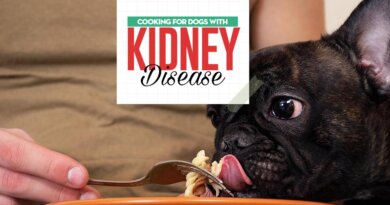Are Plant-Based Diets Good for Dogs?
Plant-based diets are trending in the U.S. The U.S. News and World Report ranked the Mediterranean diet (a nutrition plan that involves eating a ton of plant-based foods) the best overall diet in 2020. And a 2018 Nielsen report revealed that nearly 40 percent of Americans are eating more plant-based food.
When people start gravitating towards certain foods, they often start asking their veterinarians if they should be switching their pets’ diets, too. Plant-based diets are no exception.
“‘Should I buy plant-based food for my dog?’ is a question I get regularly,” says Dr. Stacy Choczynski Johnson, DVM, a vet expert at Pumpkin Pet Insurance. “A lot of human counterparts to our pets are choosing vegetarian diets, and so they are choosing the same for their pets.”
Some also feel that plant-based means “higher quality.” Ryan Bethencourt, CEO of Wild Earth, co-founded the plant-based dog food brand in 2017 after seeing dog food recalls.
“I was like, ‘Why is the food system for our pets so unsafe?’” Bethencourt recalls. “I thought, ‘What if we replaced the meat in dog food with plant-based protein?’ That set me off on a path to try to find high protein but still have plant-based food.”
Wild Earth uses yeast, which is 40 percent protein, to ensure dogs get protein in their diet. Bethencourt also believes in his product so much he ate some of it in 2019.
It tastes good — but are plant-based diets healthy for pups? Dr. Choczynski gave her take on the pros and cons of plant-based dog food.
Are plant-based dog foods good for dogs?
Some vegetarians and vegans choose the diets for ethical reasons, and they want their dogs to follow suit.
“They want to make sure that they feel morally appropriate about what they are feeding their dogs,” Dr.Choczynski says.
Dogs, like people, also go on plant-based diets for health reasons, including liver failure.
“Our livers are responsible for filtering out toxins,” explains Dr. Choczynski. “One of the things it’s responsible for filtering is ammonia.”
But if the liver breaks down, it can’t filter the ammonia. As a dog’s body breaks down meat-based proteins, it produces ammonia.
“Ammonia will float through the bloodstream…and can cause hepatic encephalopathy, which can cause seizures,” Dr. Choczynski says. “We will switch over to a soy-based diet…with the goal of lowering their blood ammonia.”
Anecdotally, dogs on plant-based diets may experience better joint health, more energy, and fewer skin and coat issues, according to a survey of Wild Earth customers.
What are drawbacks of feeding dogs plant-based food?
Dogs are omnivores, meaning they typically eat meat and vegetables. Though Dr. Choczynski says it’s possible to replace meat protein with a plant-based one, not all dogs’ bodies will take to it. She says some dogs on plant-based diets have experienced urinary crystals.
Dogs on plant-based diets may also become taurine deficient, as the amino acid is usually found in animal protein. Dr. Choczynski warns taurine deficient dogs may have heart disease or failure.
Signs your dog isn’t taking to a plant-based diet include constipation, poor coat, poor vision and weight loss. Dr. Choczynski suggests consulting with your vet before giving your dog plant-based food and if any issues arise.
What to look for when choosing dog food
You want to ensure your dog’s food, whether it’s plant-based or not, is well-balanced with all the nutrients they need to live their best lives. Dr. Choczynski advises pet parents to look for the American Feed Control Officer (AAFCO) label, which means it meets regulators’ standards as a healthy dog food.
Featured Image: Getty Images
Read Next: How to Read Dog Food Labels




